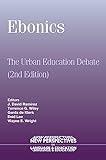Ebonics : The Urban Educational Debate / Enid Lee; ed. by David J Ramirez, Terrence G. Wiley, Gerda de Klerk, Wayne E. Wright.
Material type: TextSeries: New Perspectives on Language and EducationPublisher: Bristol ; Blue Ridge Summit : Multilingual Matters, [2005]Copyright date: ©2005Description: 1 online resource (224 p.)Content type:
TextSeries: New Perspectives on Language and EducationPublisher: Bristol ; Blue Ridge Summit : Multilingual Matters, [2005]Copyright date: ©2005Description: 1 online resource (224 p.)Content type: - 9781853597978
- 9781853597985
- African Americans -- Education
- Black English
- English language -- Study and teaching -- African American students
- Language and education -- Social aspects -- United States
- LANGUAGE ARTS & DISCIPLINES / Study & Teaching
- African American students
- Ebonics Resolution
- No Child Left Behind
- Oakland Unified School District
- Standard English
- high-stakes testing
- urban education
- 427 .973 08996073 22/eng
- LC2778.L34
- online - DeGruyter
| Item type | Current library | Call number | URL | Status | Notes | Barcode | |
|---|---|---|---|---|---|---|---|
 eBook
eBook
|
Biblioteca "Angelicum" Pont. Univ. S.Tommaso d'Aquino Nuvola online | online - DeGruyter (Browse shelf(Opens below)) | Online access | Not for loan (Accesso limitato) | Accesso per gli utenti autorizzati / Access for authorized users | (dgr)9781853597985 |
Frontmatter -- Contents -- Acknowledgements -- Introduction -- Part 1.Ebonics in the Urban Education Debate -- 1. Ebonics: Background to the Policy Debate -- 2. Using the Vernacular to Teach the Standard -- 3. Educational Implications of Ebonics -- 4. Black Language and the Education of Black Children: One Mo Once -- 5. Ebonics and Education in the Context of Culture: Meeting the Language and Cultural Needs of English Learning African American Students -- 6. Language Varieties in the School Curriculum: Where Do They Belong and How Will They Get There? -- Part 2.Background To The Ebonics Debate -- Introduction -- Oakland Unified School District’s Resolution -- A. ORIGINAL OAKLAND UNIFIED SCHOOL DISTRICT RESOLUTION ON EBONICS -- Examples of Legislative Reaction -- B.CONGRESSIONAL RESPONSE -- Legal Background -- C. MARTIN LUTHER KING JUNIOR ELEMENTARY SCHOOL CHILDREN ET AL. V. ANN ARBOR SCHOOL DISTRICT BOARD -- Linguists’ Reactions -- D. A Linguist Looks At the Ebonics Debate -- Organizational Responses -- E. POLICY STATEMENT OF THE TESOL BOARD ON AFRICAN AMERICAN VERNACULAR ENGLISH1 -- Recommended Readings on Ebonics -- Scholarly References and News Titles
restricted access online access with authorization star
http://purl.org/coar/access_right/c_16ec
Controversy erupted in 1996 when the Oakland Unified School District’s ‘Ebonics Resolution’ proposed an approach to teaching Standard English that recognized the variety of English spoken by African American students. With new demands for accountability driven by the No Child Left Behind policy and its emphasis on high-stakes testing in Standard English, this debate will no doubt rise again. This book seeks to better inform this next episode. In Part 1, leading scholars place the debate within its historical and contemporary context, provide clear explanations of what Ebonics is and is not, and offer practical approaches schools can and should follow to address the linguistic needs of African American students. Part 2 provides original documents that accompanied the debate, including the original resolutions, legislation, organization position papers, and commentary/analyses from leading linguists. This book is written for all those whose work impacts the lives of Ebonics speakers in our public schools.
Mode of access: Internet via World Wide Web.
In English.
Description based on online resource; title from PDF title page (publisher's Web site, viewed 01. Dez 2022)


